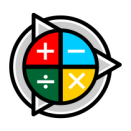MATHEMATICAL LITERACY IN ALGEBRA REASONING
Abstract
This study aims to describe prospective mathematics teacher’s mathematical literacy in algebra reasoning and thinking process in solving mathematical literacy problems. This study used a qualitative case study approach by choosing two prospective mathematics teacher who solved problems with algebraic reasoning. The result has shown that prospective mathematics teacher has algebraic reasoning in type functional thinking and use generalization in solving mathematical literacy problems. Functional thinking reasoning type used table representation and number manipulation to find and compare the value of charge in justification and decision making, while use generalization reasoning type used supposition, algebra expression, conditioning, and number manipulation to find and compare the value of charge in justification and decision making. Furthermore, use generalization reasoning type interpreted thrice in conditioning before general interpreted.
Full Text:
PDFReferences
Association of Mathematics Educators. (2009). Mathematical Problem Solving: Yearbook, 2009. (B. Kaur, Y. B. Har, & M. Kapur, Eds.). Singapore: World Scientific Publishing Co.
Beckmann, Æ. A. (2009). Supporting mathematical literacy : examples from a cross-curricular project, 223–230. https://doi.org/10.1007/s11858-008-0117-9
Blanton, M. L., & Kaput, J. J. (2005). Characterizing a Classroom Practice That Promotes Algebraic Reasoning, 36(5), 412–446.
Breen, S., Cleary, J., & Shea, A. O. (2009). An investigation of the mathematical literacy of first-year third-level students in the Republic of Ireland. International Journal of Mathematical Education in Science and Technology, 40(2), 37–41. https://doi.org/10.1080/00207390802566915
Duong Huu Tong, & Nguyen Phu Loc. (2017). Students’ errors in solving mathematical word problems and their ability in identifying errors in wrong solutions. European Journal of Education Studies, 3(6), 226–241. https://doi.org/10.5281/zenodo.581482
Edo, S., Ilma, R., & Hartono, Y. (2013). Investigating Secondary School Students’ Difficulties in Modeling Problems PISA-Model Level 5 And 6. Journal on Mathematics Education, 4(1), 41–58. https://doi.org/10.1016/S0325-7541(13)70021-X
Friel, S., Rachlin, S., Doyle, D., Nygard, C., Pugalee, D., & Ellis, M. (2001). Navigating through algebra in grades 6–8. Principles and standards for school mathematics navigations series. Reston: NCTM.
Glassmeyer, D., & Edwards, B. (2016). How Middle-Grade Teachers Think about Algebraic Reasoning. Mathematics Teacher Education and Development, 18, 92–106.
Godek, Y., Kaya, V. H., & Polat, D. (2017). Determination of the relationship between mathematics literacy, mathematics content knowledge, and science literacy, according to PISA 2012. Pressacademia, 4(1), 84–89. https://doi.org/10.17261/Pressacademia.2017.373
Hackenberg, A. J. (2013). The Journal of Mathematical Behavior The fractional knowledge and algebraic reasoning of students with the first multiplicative concept. Journal of Mathematical Behavior, 32(3), 538–563. https://doi.org/10.1016/j.jmathb.2013.06.007
Kaput, J. (1998). Transforming algebra from an engine of inequity to an engine of mathematical power by “algebrafying” the K-12 curriculum. In The Nature and Role of algebra in K-14 curriculum: Proceedings of a national symposium (pp. 25–26). Washington: NCTM.
Lamon, S. J. (2005). Teaching fractions and ratios for understanding (2nd ed). Mahwah: Lawrence Erlbaum Associates.
Lee, Y., Capraro, M. M., Capraro, R. M., & Bicer, A. (2018). A Meta-Analysis : Improvement of Students ’ Algebraic Reasoning through Metacognitive Training. International Education Studies, 11(10), 42–49. https://doi.org/10.5539/ies.v11n10p42
Letwinsky, K. M. (2017). Examining the Relationship between Secondary Mathematics Teachers’ Self- efficacy, Attitudes, and Use of Technology to Support Communication and Mathematics Literacy. International Journal of Research in Education and Science (IJRES), 3(1), 56–66. https://doi.org/10.21890/ijres.267371
Lobato, J., Ellis, A. B., Charles, R. I., & Zbiek, R. M. (2010). Developing essential understanding of ratios, proportions, and proportional reasoning for teaching mathematics in grades 6–8. Reston: NCTM.
OECD. (2016). PISA 2015 Results in Focus (Volume 1). Pisa (Vol. I). https://doi.org/10.1787/9789264266490-en
OECD. (2017). PISA 2015 Assessment and Analytical Framework. Paris: OECD. https://doi.org/10.1787/9789264281820-en
Prenzel, M., Blum, W., & Klieme, E. (2015). Assessing Mathematical Literacy. Assessing Mathematical Literacy: The PISA Experience. https://doi.org/10.1007/978-3-319-10121-7
Rellensmann, J., & Schukajlow, S. (2016). Does students ' interest in a mathematical problem depend on the problem ' s connection to reality ? An analysis of students ' interest and pre-service teachers ' judgments of students ' interest in problems with and without a connection to reality. ZDM. https://doi.org/10.1007/s11858-016-0819-3
Stacey, K. (2011). The PISA View of Mathematical Literacy in Indonesia. Journal on Mathematics Education, 2(2), 95–126. https://doi.org/10.22342/jme.2.2.746.95-126
Tariq, V. N., Qualter, P., Roberts, S., Appleby, Y., & Barnes, L. (2013). Mathematical literacy in undergraduates: role of gender, emotional intelligence, and emotional self-efficacy. International Journal of Mathematical Education in Science and Technology, 44(8), 1143–1159. https://doi.org/10.1080/0020739X.2013.770087
Uysal, Ş. (2015). Factors affecting the Mathematics achievement of Turkish students in PISA 2012. Academic Journal, 10(12), 1670–1678. https://doi.org/10.5897/ERR2014.2067
Vale, P., Murray, S., & Brown, B. (2013). Mathematical literacy examination items and student errors: An analysis of English Second Language students’ responses. Per Linguam, 28(2), 65–83. https://doi.org/10.5785/28-2-531
White, A. L. (2010). Numeracy, Literacy, and Newman's Error Analysis. Journal of Science and Mathematics Education in Southeast Asia, 33(2), 129–148.
Wijaya, A., Heuvel-panhuizen, M. Van Den, Doorman, M., & Robitzch, A. (2014). Difficulties in solving context-based PISA mathematics tasks : An analysis of students ’ errors. The Mathematics Enthusiast, 11(3), 555–584. https://doi.org/10.1139/t02-118
Yılmazer, G., & Masal, M. (2014). The Relationship between Secondary School Students’ Arithmetic Performance and their Mathematical Literacy. Procedia - Social and Behavioral Sciences, 152, 619–623. https://doi.org/10.1016/j.sbspro.2014.09.253
Refbacks
- There are currently no refbacks.
International Journal of Insight for Mathematics Teaching is licensed under
Creative Commons Attribution-ShareAlike 4.0 International (CC BY-SA 4.0)



1.png)
1.png)
3.png)
